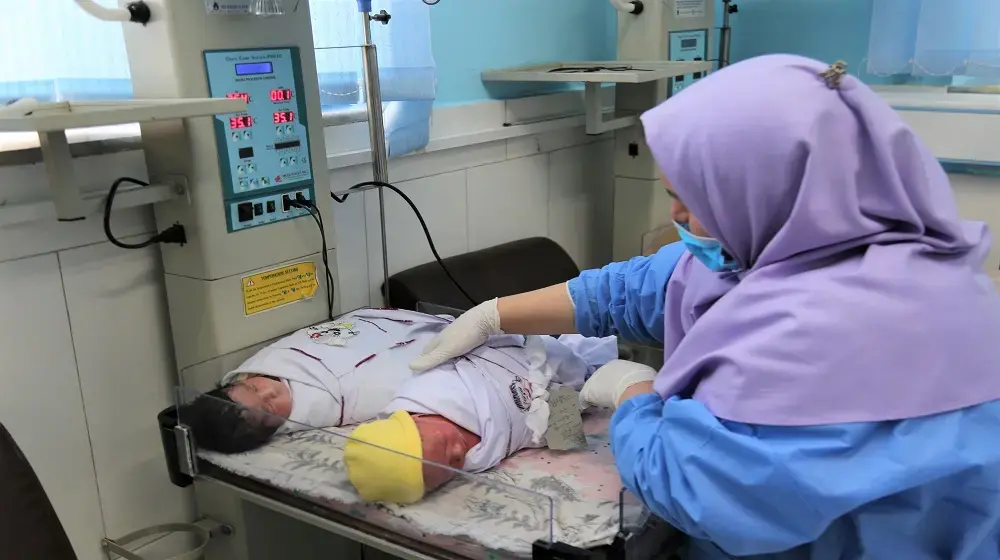Herat, 11 April 2018 - The Afghan Ministry of Public Health with technical support from UNFPA and the generous financial support from the Italian Agency for Development Cooperation inaugurated the commencement of a Community Midwifery Education programme at the Herat Institute of Health Sciences.
The programme will train 35 new midwives for the Family Health Houses to be established in Herat and Ghor Provinces. This is part of the expansion of UNFPA Family Health Houses Initiative that began in Herat province and established 9 Family Health Houses in very remote and underserved areas.
“The programme is good news for Herat and Ghor, good news for the mothers who live in remote areas of Herat and Ghor. Themothers living in remote areas in Herat and Ghor who give birth to new lives, will have access to the family health houses and trained midwives in two years and will not lose their lives due to preventable complications. I would like to thank UNFPA and the Italian Agency for Development Cooperation for their support,” said Dr. Abdul Hakim Tamana, Herat Province, Health Director.
“At UNFPA we are thrilled to witness once again that the Community Midwifery Education Programme in Herat will train 35 midwives, who will serve their community in 26 months from now and help reduce maternal and neonatal mortality in their communities. These efforts are part of our commitment to the Afghan people to end preventable maternal and morbidity in Afghanistan,” said Dr. Khalid Sharifi UNFPA Monitoring and Evaluation Specialist
Family Health Houses (FHHs) are small community based clinics that aim to provide basic Reproductive, Maternal, Neonatal and Child Health Care Services in a culturally sensitive manner offered by professionally trained midwives.
Currently Afghanistan has one of the highest maternal and neonatal death rates. Released with observation by the Ministry of Public Health, the 2015 data on Maternal Mortality from the Afghanistan Demographic and Health Survey showed pregnancy related maternal mortality as high as 1,291 maternal deaths per 100,000 live births and the neonatal mortality was reported 22 deaths per 1,000 live births.
These high numbers of deaths that usually happen due to complications during pregnancy, delivery or after delivery are mostly preventable.
Global evidences show that having enough professional midwives can avert 80% of maternal deaths. UNFPA therefore has been working on establishing community midwifery education and FHHs in very remote, hard to reach and insecure areas.
An FHH is staffed by a community midwife selected by their community and trained for 26 months in Community Midwifery Education School, managed under the Afghanistan Government Institute of Health Sciences.
UNFPA is currently supporting 123 FHHs in Daikundi, Faryab, Bamiyan and Herat. 112,000 people received basic reproductive health services in these FHHs in 2017. At this time with 2 million euros generous funding from the Italian Agency for Development Cooperation 35 new Family Health Houses will be established in remote and underserved area of Ghor (15 FHHs) and Herat (20 FHHs).
Sites to build the FHHs have already been identified in collaboration with the Provincial Public Health Directorates and the local communities in the two provinces and 35 women have also been identified who will be trained in the Herat Institute of Health Sciences in Community Midwifery Education Programme.
After 26 month of community midwifery education the 35 midwives will be stationed in the new FHHs, where they will serve their own communities from which they were selected. All the former 9 and the new 20 FHHs in Herat will serve an estimated population of 240,000 people with Reproductive, Maternal, Neonatal and Child Health (RMNCH) services and the FHHs in Ghor will serve an estimated population of 60,000 people with similar services.
UNFPA’s vision is to end maternal deaths, end unmet need for family planning and end violence and harmful practices against women and girls.



